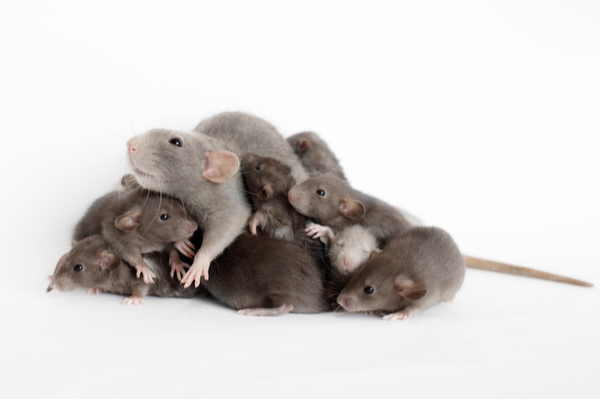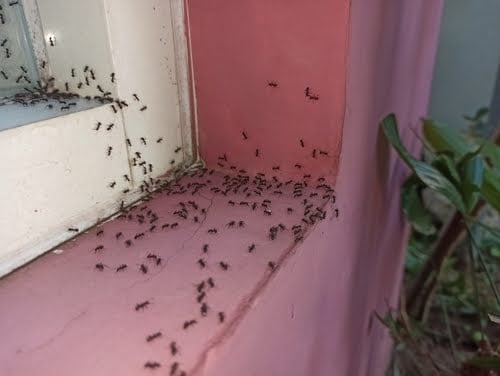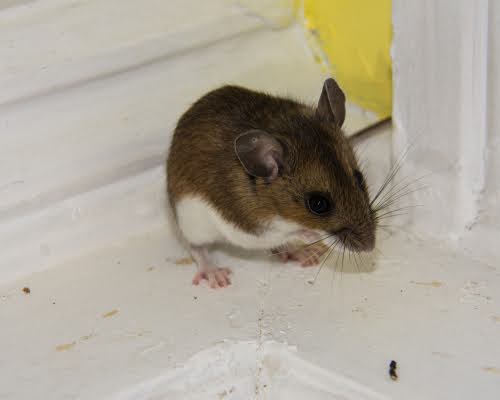Rodent populations can get out of hand quickly. For example, when female rats are in their ideal environment, they can produce five litters a year. A single litter alone has anywhere from seven to fourteen pups. This means that if a rat is reproducing in your home, there could be 70 rat babies crawling around!
If you don’t pay attention to signs of a rodent infestation, your home could be overrun quickly. Keep your eyes peeled for the following signs that mice or rats are reproducing in your space.
What Are the Signs That There Are Rodents in My Home?
If you have one or two mice in your house, you may not see all the telltale signs. However, if rodents are reproducing in your home and you have a full-blown infestation, you will see signs of their presence, including:
- Droppings: Mouse droppings are small, ovular, dark, and dry pellets. Rat droppings look similar but they are slightly larger and darker. You’ll probably find droppings near walls, corners, baseboards, door frames, and window frames.
- Gnaw marks: Rodent teeth never stop growing. Rats and mice have to chew constantly to keep their teeth from becoming unmanageable. They’ll chew cords, boxes, furniture, door frames, doors, and anything else they can find.
- Strange noises in the walls. Mice and rats are both nocturnal. They’ll frequently build their nests by burrowing into your walls or beneath your floors. You might hear them gnawing or burrowing through walls at night when they become active.
- Grease marks where the wall meets the floor. Rodents have poor eyesight. When they travel, they tend to stick close to the walls for guidance. Over time, they will leave behind greasy smears along the walls. Look for these markings particularly in your basement.
- Nests or nesting materials: Mice and rats build nests using shredded paper, fabric, insulation, or other soft materials. These nests are often hidden in dark, undisturbed areas like behind appliances, in storage boxes, attics, or basements.
- Unusual pet behavior: If your pets are pawing at walls, sniffing intensely at vents, or fixating on certain areas, they may be detecting rodent activity.
- Odor: A strong, musty ammonia-like smell is often associated with rodent urine, especially in enclosed areas. The scent intensifies as the infestation grows.
These are indicators that rats have started a family in your space. To solve your rat or mouse problem, give Plunkett’s a call!

How Can I Keep Rodents from Getting Inside?
To keep mice and rats from entering your home, you should:
- Conduct perimeter checks. Rodents are good at squeezing through small entry points. Take a look at the outside perimeter of your residence. Repair any crumbling brick, torn screens, or other breaches.
- Take out the garbage regularly. Rodents are scavengers by nature and they are not opposed to eating trash. Take out your trash regularly.
- Keep your house clean. Crumbs, spills, and clutter all attract rodents. Wipe down counters, sweep floors, store food in airtight containers, and avoid leaving pet food out overnight. A tidy home is far less appealing to mice and rats.
- Don’t ignore the signs. Life gets busy. Sometimes it’s easier to pretend there isn’t a problem. Do not do that when it comes to a rodent infestation. Give us a call the minute you suspect a problem.

Stop the Scurrying: Get Reliable Mouse & Rat Control Today
If you’ve taken preventive measures but you’re still seeing the signs of a rodent infestation, it’s time to get professional help. Without intervention, rodent populations can spiral out of control in a matter of weeks. Fast reproduction, paired with their ability to stay hidden, is why early detection and professional treatment are critical. At Plunkett’s, we have the years of experience needed to help handle your mouse or rat infestation quickly and effectively. Schedule a service today!









